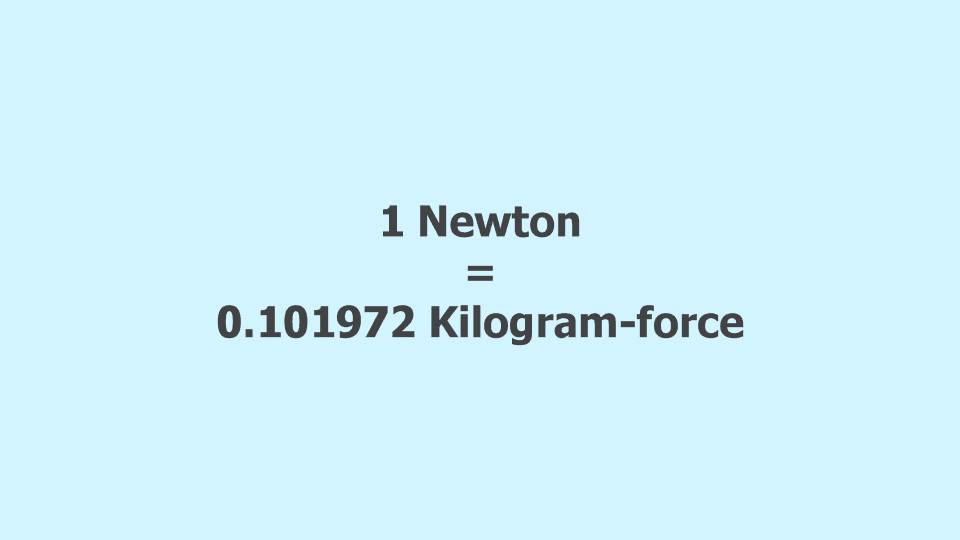Convert Newton (N) to Kilogram-force (kgf)
Please provide values below to convert Newton (N) to Kilogram-force (kgf).Force Converter
Convert from
Convert to
**Formula:
Discover Other Unit Converters
Try Other Force Converters
Dyne to Pound-forceDyne to NewtonKilogram-force to DyneKilogram-force to KilonewtonKilogram-force to Pound-forceKilogram-force to NewtonKilonewton to Kilogram-forceKilonewton to Pound-forceKilonewton to MeganewtonKilonewton to NewtonPound-force to DynePound-force to Kilogram-forcePound-force to KilonewtonPound-force to NewtonMeganewton to Kilogram-forceMeganewton to Kilonewton
Updated on December 1, 2025
You can use our Newton (N) to Kilogram-force (kgf) conversion calculator as a reliable and efficient tool to simplify force conversions. It is designed for professionals, students, and anyone who needs a quick and accurate result. Conversion of Newton (N) to Kilogram-force (kgf) is crucial in Physics, Engineering related measurements. You can avoid the risk of manual calculation errors and save valuable time using our Newton (N) to Kilogram-force (kgf) converter.About Newton (N) to Kilogram-force (kgf) Conversion Calculator
Written By Nadiba Rahman
Nadiba Rahman
Reviewed by Mrinmoy Roy
Mrinmoy Roy
Share This Post
URL copied!
Relation Between Newton (N) and Kilogram-force (kgf)
Let me explain to you about the relation between Newton N and Kilogram-force (kgf) first before moving to the conversion process. Because it’s essential to grasp what these units represent.What is Newton (N)?
The newton is the SI unit of force. Newton (N) is a unit of force measurement which is commonly used in Physics, Engineering. The newton is defined as the force required to accelerate a mass of one kilogram at a rate of one meter per second 1 squared. It is a fundamental unit in many areas of physics and engineering..What is Kilogram-force (kgf)?
Newton (N) is another unit of force measurement that is used in Physics, Engineering. A kilogram-force is the force exerted by gravity on a one-kilogram mass under standard gravity (approximately 9.80665 m/s²).. The newton is defined as the force required to accelerate a mass of one kilogram at a rate of one meter per second 1 squared. It is a fundamental unit in many areas of physics and engineering..How to Convert Kilogram-force (kgf)?
The conversion between Newton (N) and Kilogram-force (kgf) follows a simple formula:Newton = Newton × 0.10197162129779283
Where, 0.10197162129779283 is the value that allows you to convert between Newton (N) and Kilogram-force (kgf).
So,
1 Kilogram-force = 0.10197162129779283 Newton
And, 1 Newton = 1/0.10197162129779283 Kilogram-force

Examples of Converting Newton (N) to Kilogram-force (kgf)
To convert any value from Newton (N) to Kilogram-force (kgf), simply multiply the amount of Newton (N) by the conversion factor:1 Kilogram-force = 0.10197162129779283 Newton
For example, if you want to convert 5 Newton into Kilogram-force and the conversion factor is 0.10197162129779283, then:
5 Newton = 5 x 0.10197162129779283 Kilogram-force
Newton (N) to Kilogram-force (kgf) Conversion Chart
Here’s a quick reference chart for common conversions between Newton (N) and Kilogram-force (kgf)| Newton (N) | Kilogram-force (kgf) |
|---|---|
| 5 Newton (N) | 0.5098581064889641 Kilogram-force (kgf) |
| 10 Newton (N) | 1.0197162129779282 Kilogram-force (kgf) |
| 15 Newton (N) | 1.5295743194668925 Kilogram-force (kgf) |
| 20 Newton (N) | 2.0394324259558565 Kilogram-force (kgf) |
| 25 Newton (N) | 2.5492905324448207 Kilogram-force (kgf) |
| 30 Newton (N) | 3.059148638933785 Kilogram-force (kgf) |
| 35 Newton (N) | 3.569006745422749 Kilogram-force (kgf) |
| 40 Newton (N) | 4.078864851911713 Kilogram-force (kgf) |
| 45 Newton (N) | 4.588722958400678 Kilogram-force (kgf) |
| 50 Newton (N) | 5.0985810648896415 Kilogram-force (kgf) |
How 1 Newton (N) Converts to Other force Units
See the relation between Newton (N) and other force related measurement units:| 1 Newton(N) | 100000.000000 Dyne (dyne) |
| 1 Newton(N) | 0.000225 Kips |
| 1 Newton(N) | 0.001000 Kilonewton (kN) |
| 1 Newton(N) | 0.224809 Pound-force (lbf) |
| 1 Newton(N) | 0.000001 Meganewton (MN) |
| 1 Newton(N) | 0.001000 Sthene (st) |
Features of Our Newton (N) to Kilogram-force (kgf) Conversion Calculator
Our Newton N to Kilogram-force (kgf) converter is more than just a basic converter. Here's what makes it stand out:Output Precision Control
You can control how precise your conversion results are. From settings, you can adjust decimal places from 0 to 12 places.Customizable Rounding Options
You can control the output rounding options based on your necessity. You can turn the rounding mode on or off, and select between Ceiling or Floor rounding to match your needs.Multiple Number Formats
Display your results the way you want:- Standard format (e.g. 12.345245)
- Scientific notation (e.g. 1.23452e+1)
- Engineering format (e.g. 1.23452 × 10^1)

